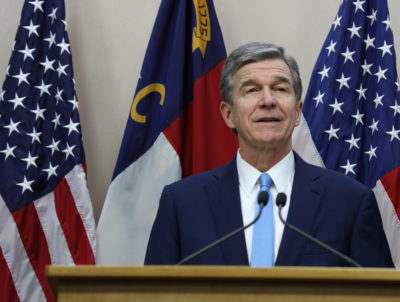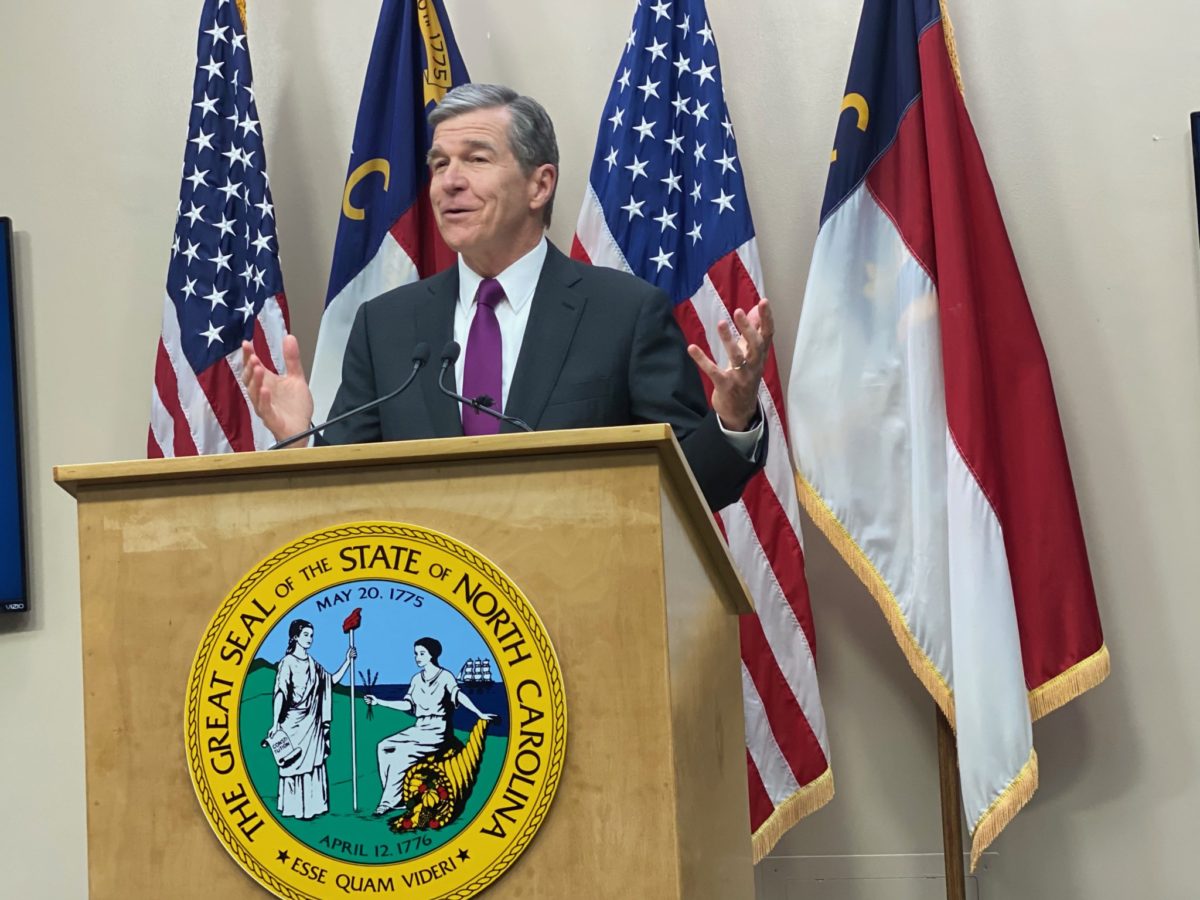
Share this story
- Gov. Roy Cooper is suggesting an additional 2.5% average pay increase for teachers, bringing the total teacher pay increase over the two years of the biennium to 7.5%. Find out what else he wants for education in North Carolina.
- “Long before they reach community college or become entrepreneurs, North Carolina's children need a foundation for strong success in the classroom," said @NC_Governor at a press conference on his budget plans for #nced.
|
|
Democratic Gov. Roy Cooper wants bigger salary increases for teachers, a restoration of master’s pay, and full funding for year three of the Leandro comprehensive plan.
He unveiled his budget proposal for the next fiscal year on Wednesday afternoon, only days after the release of a consensus revenue forecast. This forecast indicates that the state will have a roughly $4 billion surplus for the current fiscal year and almost $2 billion for the next one.
“Long before they reach community college or become entrepreneurs, North Carolina’s children need a foundation for strong success in the classroom,” Cooper said at a press conference Wednesday.
The governor’s proposed budget is a revision to the second year of the biennium budget passed late last year. His budget covers fiscal year 2022-23.
What does the governor want in K-12?
Last year’s spending plan included an average 5% pay increase for teachers over two years. On top of that, the governor’s budget would add 2.5% in the second year, bringing the average pay increase to 7.5% over two years.
In addition, Cooper is proposing $827 million in bonuses for state employees, including $2,000 for state employees making less than $75,000 a year and an additional $1,000 specifically for teachers and some other educators. That means most teachers would get a total of $3,000 in bonuses, according to Cooper’s plan.
The governor is also proposing that the state spend $500 million on public school construction, with each school district getting a base amount of $500,000 and then further funding based on Average Daily Membership — essentially the size of the district’s student population.
Here is how that breaks down by district.
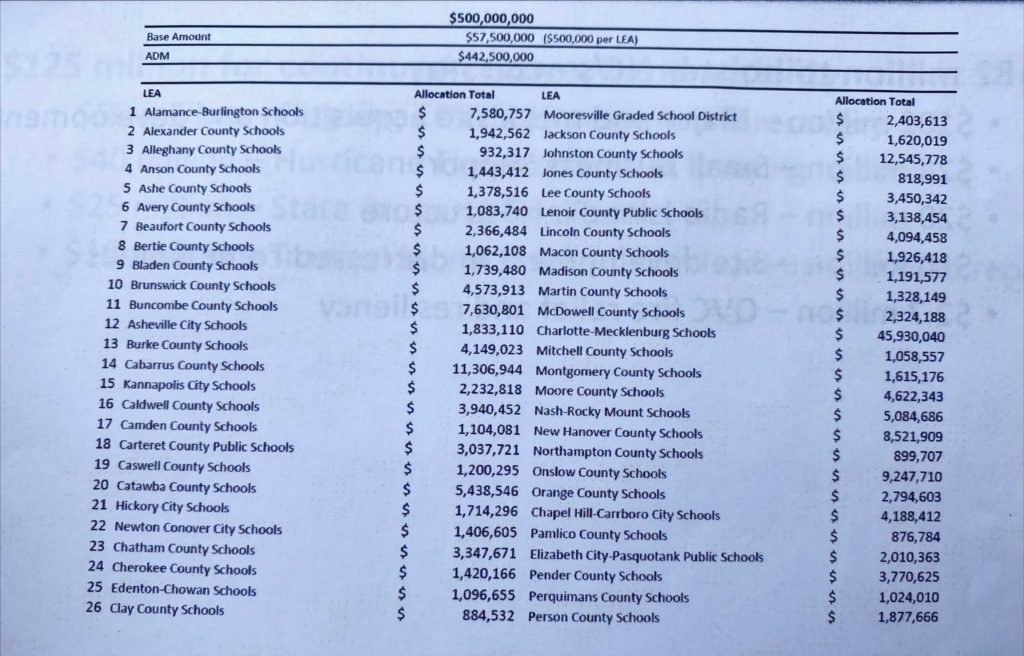
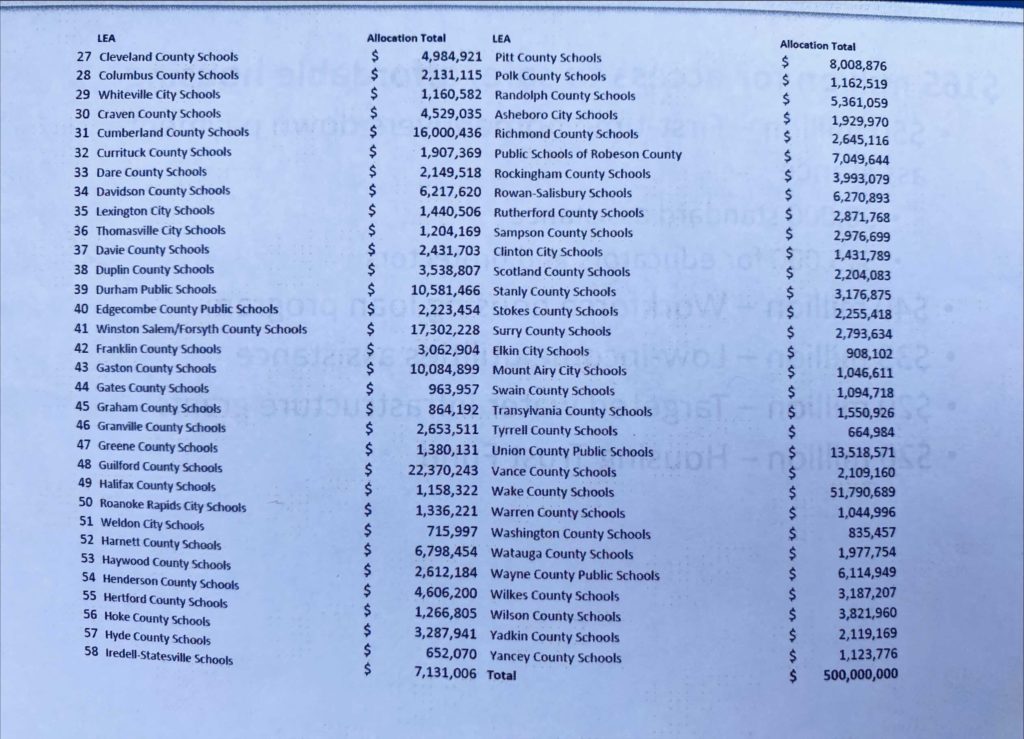
The governor’s budget also includes funding for the priorities voted on at the most recent State Board of Education meeting, including eight coaches to help turnaround low-performing schools, funding for a school psychologist internship program, money for regional coaches and 115 early literacy specialists to help support early literacy efforts, and increased money to cover the rising cost of fuel for school buses.
Cooper added $75 million to the $100 million for local teacher supplements provided for in the long session budget, and expanded the program to include all districts.
This program gives each district in the state funding to increase the amount of supplements they are able to give teachers using local funds. However, the biennium budget left off a few districts: Wake, Durham, Buncombe, Mecklenburg, and Guilford.
Republican leaders argued that these districts were well off enough that they didn’t need help with supplements, while opponents argued that Republicans were targeting Democratic lawmakers who weren’t willing to go along with their legislative plans.
Cooper also re-upped his attempt to get Master’s pay restored for teachers. The Republican-led General Assembly got rid of it in 2013.
The governor’s budget also generally fully funds the third year of the Leandro comprehensive plan — a multi-year strategy designed by parties in the case to get the state in line with its constitutional obligation on education.
The case has been stuck in court proceedings since former Leandro judge David Lee ordered about $1.7 billion to be transferred from the state’s General Fund to pay for two years of the comprehensive plan. Currently, the state Supreme Court is slated to take the case up.
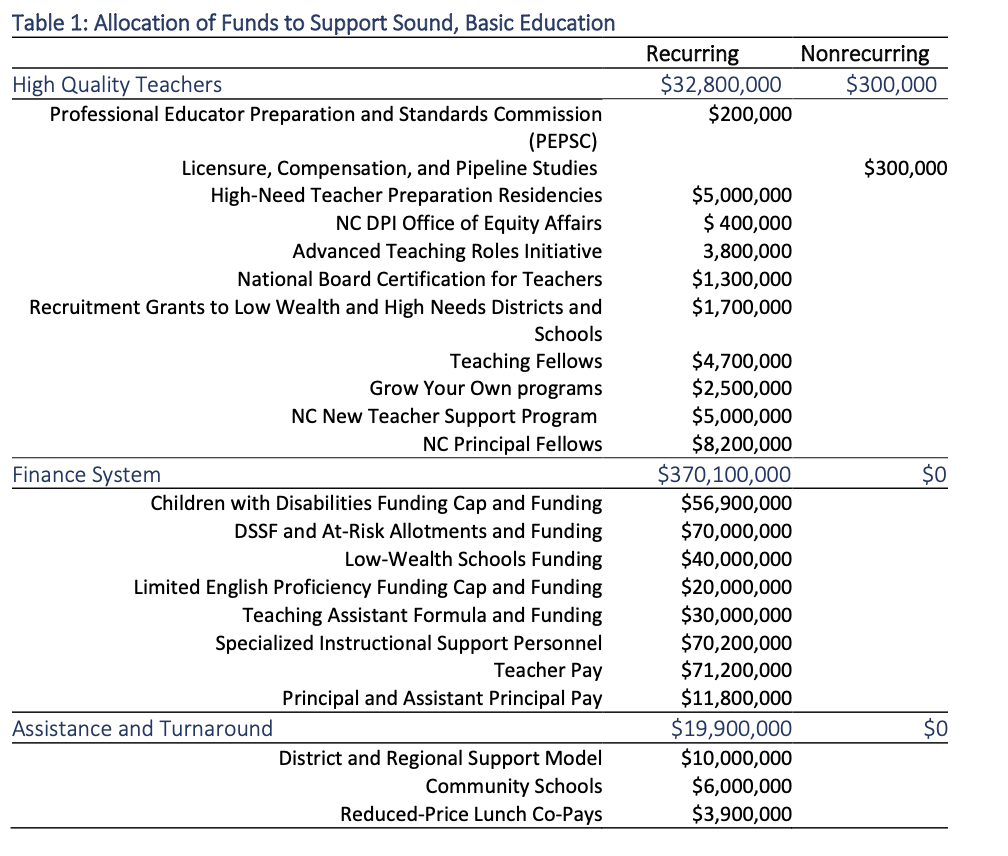
How about early childhood?
The governor’s proposed budget will provide funding to increase reimbursement rates for N.C. Pre-K by 19% and adjust administrative reimbursement rates from 6% to 10%.
Cooper also includes $26 million in funding for a program to help improve pay for early childhood educators and $10 million to bolster Smart Start.
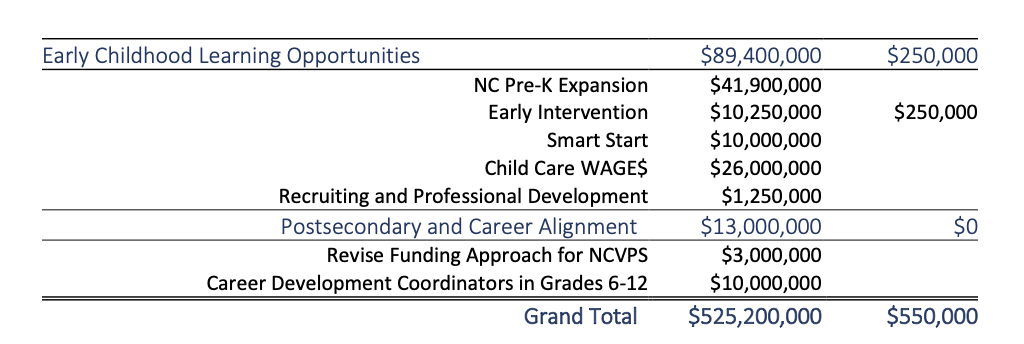
And community colleges?
The governor’s budget would double the 2022-23 pay increase for community college staff from 2.5% to 5%. Additionally, community college staff are eligible for the $2,000 bonus that all state employees making $75,000 or less get. Basically, all state employees get $1,500, and then employees paid under $75,000 get an additional $500.
The budget plan also has $50 million to “create additional capacity” at all of the state’s community colleges. The funding is meant to help these colleges expand courses, create new programs, and more.
Cooper is also proposing a little more than $25.5 million to help with retention and recruitment at community colleges. The budget document states that “agencies may use these funds to address turnover, equity, and compression and to adjust salaries to better compete for and retain talent.”
There is also $10 million in non-recurring money for grants for an early childhood education center pilot program, and $15 million that is a mix of recurring and non-recurring dollars to be used to increase the number of health care workers trained at community colleges.
Can state leaders get along?
The long session was marked by unprecedented cooperation between Cooper and Republican leaders, largely to avoid a repeat of 2019 when Cooper vetoed the budget, lawmakers failed to overturn it, and the state went without a budget for two years.
In the end, negotiations fell apart, but Cooper still signed the budget because it reflected many of his priorities. State Budget Director Charlie Perusse said during Wednesday’s press conference that similar levels of cooperation are happening with this budget, with regular briefings and conversations taking place.
“We’re building on the success and the cooperation that happened in November,” he said. “My office and the governor’s legislative staff have been having conversations with the Republican leadership and House and Senate Democrats, really for the last month or so.”
Tamika Walker Kelly, president of the North Carolina Association of Educators, released a statement Wednesday afternoon supporting Cooper’s proposal.
“Budgets show us where someone’s priorities are, and Gov. Cooper’s proposal communicates in no uncertain terms that the well-being and prosperity of our students, educators, schools and communities will be a focus for this administration during the coming budget negotiations,” she said. “Following the unprecedented challenges educators faced over the last few years, we’re grateful to see Gov. Cooper propose these needed investments in our education system. For too long educators in our state have been forced to make do with too little, and we’re encouraged to see Gov. Cooper attempting to right those wrongs.”
The legislative short session starts next week. Before a revised budget for the second year of the biennium is finalized, both the Republican-led House and Senate will have to release their proposals.
Here is the full recommended budget.
Here are the education highlights.



